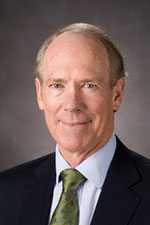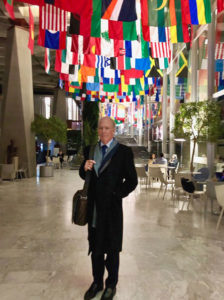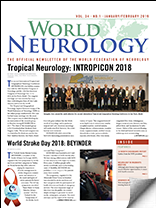As I write this first column for 2019, the business of the World Federation of Neurology (WFN) is well under way. It is, however, the first anniversary of the new administration, and I will therefore present a dashboard, or update, of where we are at this point.

William Carroll, MD
London Office
To deal first with the heart of the WFN, I will summarize the state of the London office. A new computer-based calendar system known as Asana has been employed successfully.
It provides a common base for the office, individuals within the office, and trustees and committee chairs as required. Also, projects related to different calendar times or that operate throughout the year can be allocated to members of the team. Not only does it provide a readily accessible timeline for all projects, it also records the operating framework for all WFN activities. It should provide the flexibility to enable any team member to step into the role of any other team member at the same level of operational competence.
Thus far, it has been of considerable assistance, and I am sure we will develop its use even more profitably over time.
During this last year, a review of the website and its contents has been undertaken. Sections of the website have been updated, and others, including those related to committees and Specialty Groups (formally known as Applied Research Groups), particularly their roles and responsibilities, are currently undergoing the same process under the direction of the Secretary-General Wolfgang Grisold. The website is now also under more regular and systematic review to ensure that information is current. Through the efforts of Walter Struhal and his committee, e-communications using social media have increased in volume and professionalism.
 An important part of the office and website changes is the development of uniform internal and external branding. A draft document currently before the trustees details logos, brands, and symbols that can be used and how they must be used. It is hoped that this will improve the recognition of WFN material. All office staff have participated in these revisions and improvements.
An important part of the office and website changes is the development of uniform internal and external branding. A draft document currently before the trustees details logos, brands, and symbols that can be used and how they must be used. It is hoped that this will improve the recognition of WFN material. All office staff have participated in these revisions and improvements.
Finally, operational procedures and policies have been revised and, in instances, clarified. Regional teaching center memorandums of understanding (MOUs), WFN loans for educational meetings sought by Specialty Groups, and guidelines for applying for research grants have been implemented and/or revised to bring improved clarity and accessibility.
Trustees
Moving to the trustees: They continue to meet by conference call each month. All have a particular area of responsibility within the WFN aside from their general duty of guiding the organization. The Council of Delegates meeting held during the Berlin European Committee for Treatment and Research in Multiple Sclerosis (ECTRIMS) meeting saw the election of Dr. Alla Guekht as one of three elected trustees. She replaced Dr. Morris Freedman, who had made notable contributions to the educational efforts of the WFN, particularly in the electronic form, and for which we owe him considerable thanks. He continues to serve as chair of the membership committee, for which we are also most appreciative. Also, the Secretary-General, Dr. Wolfgang Grisold, was reelected for another term.
Strategic Issues
The trustees have dealt with and are continuing to deal with several strategic issues. These include the Global Neurological Alliance (GNA), about which I have written previously. With the release of the latest global burden of neurological disorders (Lancet Neurology 2018) showing the considerable rise in numbers of people affected by neurological noncommunicable diseases, the GNA is likely to have a pivotal role in the relationship with the WFN and in turn its relationship with the World Health Organization (WHO). It is worth mentioning that the revised International Classification of Disease (ICD11), is due to be released this year, with the major change being the reclassification of stroke as a brain disease rather than a cardiovascular disease. At the January executive board meeting of the WHO in Geneva, the WFN took the opportunity to post a statement on this matter. Other posts published during this meeting included those on combating noncommunicable diseases, access to medicines, the action plan for epilepsy, and World Brain Day as part of the WHO review of world health days.
In addition to these matters, the WFN has been active in other global health matters, most notably WHO conferences on dementia (attended by Riadh Gouider), the Regional WHO meeting in September in Rome, and the WHO general assembly in New York (attended by Wolfgang Grisold), and the Global Burden of Neurological Disorders World Summit (which I attended).
World Congress of Neurology: Dubai
In closing, allow me to remind everyone of this upcoming World Congress of Neurology to be held Oct. 27-31, 2019, in Dubai. It will be a most fulfilling educational experience for all, and I urge everyone to encourage younger colleagues and trainees to attend. Provision has been made for all levels of accommodation, and travel grants and bursaries will be as abundant as they were for the Kyoto meeting. Visas will be procurable for all. If in doubt on any of these matters, please visit the WFN/WCN website, or contact Jade at the London office of the WFN or Tami Gaon of Kenes, the point of contact for the WFN. •
